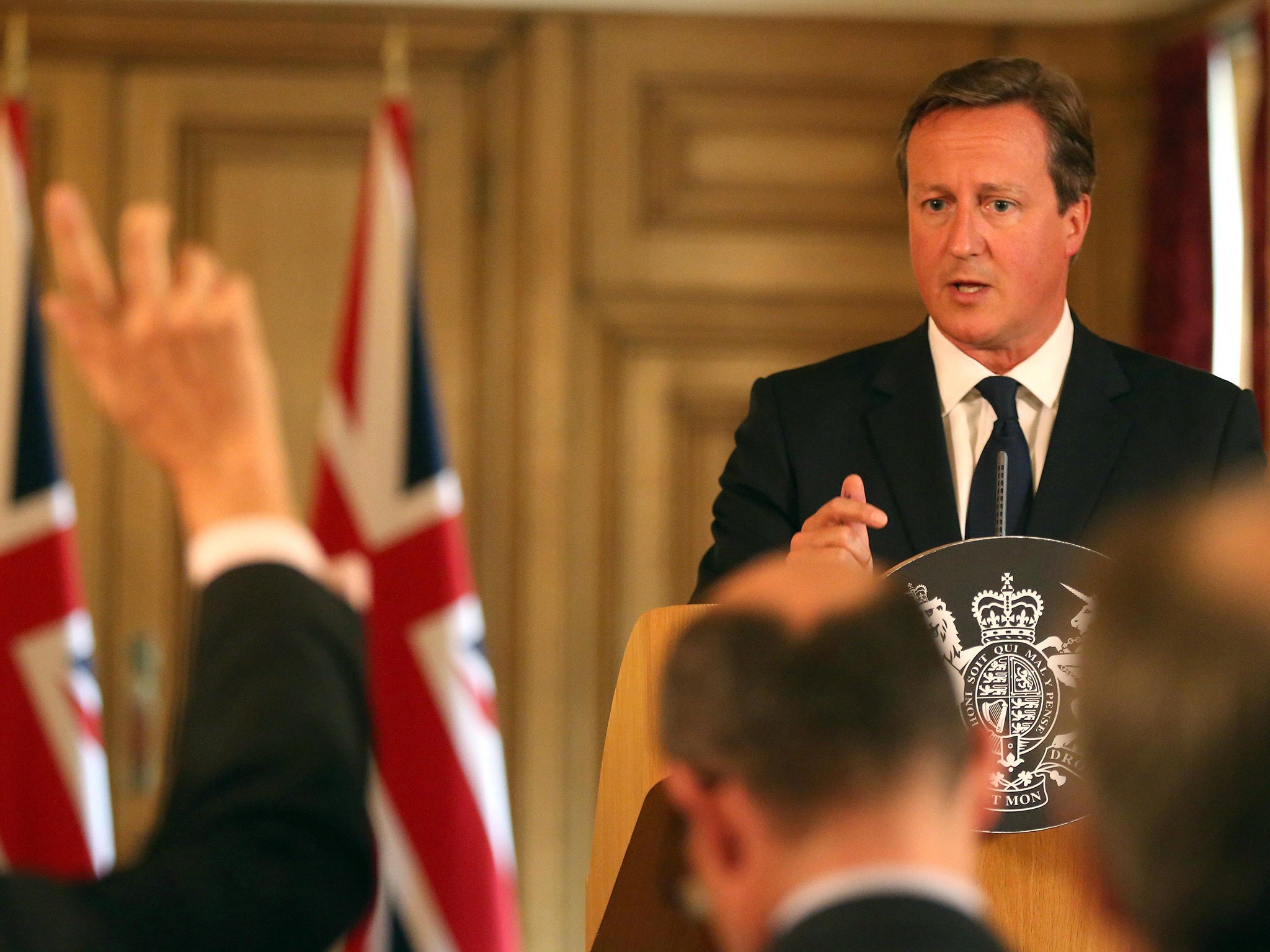David Cameron drops plans for vote on Syria air strikes
New report says the Prime Minister is yet to make the case or produce a clear plan for military action against Isis

Your support helps us to tell the story
From reproductive rights to climate change to Big Tech, The Independent is on the ground when the story is developing. Whether it's investigating the financials of Elon Musk's pro-Trump PAC or producing our latest documentary, 'The A Word', which shines a light on the American women fighting for reproductive rights, we know how important it is to parse out the facts from the messaging.
At such a critical moment in US history, we need reporters on the ground. Your donation allows us to keep sending journalists to speak to both sides of the story.
The Independent is trusted by Americans across the entire political spectrum. And unlike many other quality news outlets, we choose not to lock Americans out of our reporting and analysis with paywalls. We believe quality journalism should be available to everyone, paid for by those who can afford it.
Your support makes all the difference.David Cameron’s support for launching air strikes on jihadists in Syria has been condemned as “incoherent” by an influential Tory-controlled Commons committee as reports claim that the Prime Minister has dropped plans to push for bombing raids in the country.
The Prime Minister has failed to make the case for launching military action against Isis fighters in Syria and, MPs say in a new report, is yet to produce a clear plan for defeating the jihadists or ending the country’s bloody civil war.
Dealing a heavy blow to his prospects of winning the backing of MPs for extending air strikes from Iraq to Syria, the report was critical of the Government’s lack of strategy.
The Times reported last night that Mr Cameron has abandoned plans to push for air strikes against Isis in Syria and that the Commons vote on extending military action over the border from Iraq will not now go ahead. It said the Prime Minister had failed to persuade enough of Jeremy Corbyn’s MPs to defy their leader or to quell a Tory rebellion endangering his slim parliamentary majority of 12.
Mr Cameron has been paving the way for launching bombing raids in Syria, announcing moves to bolster SAS operations in the country and to double the number of unmanned drones operating in its airspace.
Ministers have warned that deadly plots against Britain are being orchestrated from Isis strongholds in Syria, arguing that its border with Iraq is irrelevant in combating the jihadist threat.
But the Commons Foreign Affairs Select Committee report said: “We believe there should be no extension of British military action into Syria unless there is a coherent international strategy that has a realistic chance of defeating Isis and of ending the civil war in Syria. In the absence of such a strategy, taking action to meet the desire to do something is still incoherent.”
We believe there should be no extension of British military action into Syria unless there is a coherent international strategy that has a realistic chance of defeating Isis
It listed a series of questions over military and diplomatic planning which it said ministers had failed to answer satisfactorily, and concluded: “Until it is possible for the Government to address these points we recommend it does not bring to the House a motion seeking the extension of British military action to Syria.”
Following his Commons defeat in August 2013 when he sought approval to authorise air strikes against President Bashar al-Assad’s forces, Mr Cameron has pledged to seek MPs’ backing if he wants to order bombing raids in Syria.
As a significant number of Conservatives would oppose the action, the Prime Minister would need to win the support of some Labour MPs to command a Commons majority for the move. The MPs’ strongly worded conclusions set back Mr Cameron’s hopes of securing cross-party approval for raids.
Philip Hammond, the Foreign Secretary, said: “Defeating Isis and ending the Syrian conflict are two faces of the same problem that Britain is working tirelessly with our international partners to overcome.”
He added: “It is right that we continue to use military force against Isis while we use diplomatic power to work towards a political solution in the Syrian civil war.”
Hilary Benn, the shadow Foreign Secretary, said: “The narrow question of whether or not we should carry out air strikes in Syria appears to have been the focus of the Government’s attention at the expense of developing a coherent political strategy for ending a civil war that has claimed 200,000 innocent civilian lives, the majority at the hands of Assad’s forces. This will only happen through a negotiated settlement led by the United Nations.”
Subscribe to Independent Premium to bookmark this article
Want to bookmark your favourite articles and stories to read or reference later? Start your Independent Premium subscription today.
Join our commenting forum
Join thought-provoking conversations, follow other Independent readers and see their replies
Comments